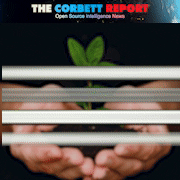Podcast: Play in new window | Download | Embed
Ellen Brown, frequent Corbett Report guest and author of The Web of Debt and Banking on the People: Democratizing Money in the Digital Age, joins us to discuss her latest articles on the bank runs that are leading us toward the event horizon of the quadrillion-dollar derivative black hole.
Watch on Archive / BitChute / Odysee / Rokfin / Rumble / Substack / Download the mp4
SHOW NOTES:
Ellen Brown on The Corbett Report
The Looming Quadrillion Dollar Derivatives Tsunami
What Will Happen When Banks Go Bust? Bank Runs, Bail-Ins and Systemic Risk
Banks brace more drama with SVB, Credit Suisse up in the air
JPMorgan Acts to Buy Ailing Bear Stearns at Huge Discount
Large US Banks Inundated With New Depositors As Smaller Lenders Face Turmoil








Thank you James for addressing this topic. I am more hopeful after watching this. I’ve order a couple of the recommended books too!
If you are referring to the email service, you should be able to find the unsubscribe link near the bottom of the email. Just click that and follow the steps as described.
After watching an interview with Richard Werner a few years ago called “The Finance Curse” – https://www.rt.com/shows/renegade-inc/379579-uk-finance-curse-suffer/ at around 16:20 in I think he explains how money is created – via debt. He also says the same thing that there is no such thing as a deposit – you are leading money to the bank. I am sure he mentions also that banks do not lend customers money – they create new money with the loan contract. I am probably wrong though.
Most of whar banks loan out is just credit. With fractional reserve lending it has to be. They used to keep 10% as reserve, but FED covertly dropped that to 1%. It’s all kept very silent and behind a fog of war.
I sense it might exist a connection to be made between Graeber’s take and Say’s Law “Supply creates its own demand”.
Still I just see it though the fog.
Any input?
https://en.m.wikipedia.org/wiki/Say%27s_law
https://en.m.wikipedia.org/wiki/Supply_creates_its_own_demand
Ellen Brown is misleading: it is not good that all money is ‘credit’. Think about this: whenever a commercial bank signs a loan agreement with a borrower, the bank creates the deposit in the borrower’s account. The loan agreement is an asset to the commercial bank; the borrower’s deposit is a liability to the bank. Why a liability? Because you, the depositor, can walk into the bank and demand federal reserve notes, which is the ‘real money’. Federal reserve notes in your hand do not disappear when a bank goes bankrupt, like your deposit. That said, all 13 colonial legislatures issued their own paper money and issued it to support their economies, and would not let commercial banks into the colonies. This was real money, not bankmoney, i.e. bank credit creation. As soon as the Revolutionary War was won, the new states began chartering private commercial banks with the power to issue their bank credit. Thus, we won the war, but lost it to the banks very soon after.
Fiat can only be considered currency, not money, regardless of the issuer.
The idea that credit is not bad in itself takes in account the trustworthyness of the issuer.
Having real money (like gold) is prone to scarcity issues, both real and engineered.
Having printed currency is mired with trust issues: who would print such currency?
Self issued credit would allow entites that take part in the market to issue IOUs of their own, that are later to be settled with goods and services, and that would be backed by the reputation of the issuer.
Such system is more complex, but it does not suffer from above mentioned issues, and it would, for all intents and purposes, by desing prevent manipulation from the outside. It would be simply impossible for anyone to tighten the spigot and cause the financial system to halt.
Good statement.
I just love it when James Corbett interviews Ellen Brown!
I’ve enjoyed every interview with her.
Her communication style is excellent, because she can express concepts in layman terms.
It is a shame we did not have time for more backstory and discussion, because our topic was limited to Solutions.
So what are the solutions? Is it better to hold short term treasuries than to “lend” money to a bank?
I thought that the Ellen Brown article linked in the shownotes was a ‘keeper’.
It walks a person through things.
The idea of public banking troubles me somewhat. It seems to be handing the key to currency control to the same statist public sector that represents the face of the threat to ordinary people.
I’ve read some parts of https://publicbankinginstitute.org/ so far, with more go. I’ve also skim-read https://thebndstory.nd.gov/an-agile-partner/ , as cited by the PBI as a case study.
To quicken my own research, does anybody know of any research papers by either academics or business writers who have analysed the idea of public banking, e.g. https://www.tandfonline.com/doi/full/10.1080/09538259.2021.1898110 .